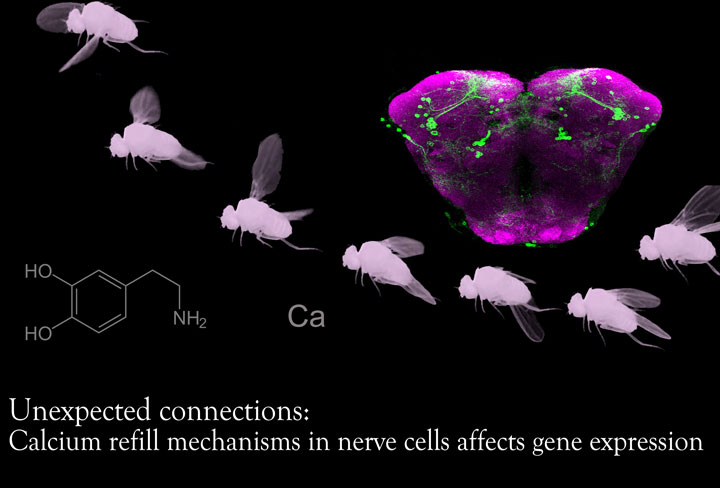Unexpected connections: Calcium refill mechanisms in nerve cells affects gene expression
Calcium, is not just for strong bones - it is an essential requirement for normal muscle and nerve cell function. Recent research now shows that Calcium ion homeostasis in nerve cells is linked to another important process - it may be regulating the levels of an important signalling molecule called dopamine.
Gaiti Hasan's lab at the National Centre for Biological Sciences (NCBS, Bangalore) has provided fresh insights into how the Calcium molecule is necessary for the myriad mechanisms supporting life. Hasan's group now show that a process called SOCE (Store Operated Calcium Entry) which works to maintain calcium levels in cells could also play a role in maintaining the levels of the vital neurotransmitter dopamine.
SOCE is a process by which Calcium ions slowly enter nerve cells to refill stores that have been depleted by various activities. Central to this process is a protein named Orai, which acts as a channel that allows the entry of Calcium ions into cells. The ORAI1 gene is known to be important for T-lymphocytes, as loss of this gene function leads to Severe Combined Immunodeficiency syndrome (SCID) in humans.
In Drosophila flies, the Orai gene function is required in neurons for the ability to initiate and maintain flight. The current study used Drosophila flies with mutated Orai genes which did not allow normal SOCE to operate. The Hasan group observed that if SOCE was inhibited during pupal development in certain neurons, the adult mutant flies could not fly. So, Calcium appears to be vital to the wiring process that creates a 'flight circuit' in the fly brain. Now why should this be important?
This result is important because it reveals a potential link between SOCE and the neurotransmitter called dopamine. Dopamine is an indispensable neurotransmitter in the brain, controlling motor function, cognitive control and much more. In the flightless Orai mutant flies, SOCE was inhibited in a set of nerve cells called 'dopaminergic interneurons' - neurons that used dopamine to relay signals. Further investigations into this phenomenon revealed that SOCE and its role in maintaining Calcium homeostasis in nerve cells affected the transcription of several genes related to dopamine synthesis and transport.
Trayambak Pathak, who has been working with Hasan's group on Drosophila Orai for his Ph.D, is the first author of the paper describing these results in the Journal of Neuroscience. "We expected that inhibition of the calcium refilling process, ie, SOCE, in nerve cells would impair and ultimately stop their functioning, perhaps by killing them. It was quite a surprise when we discovered instead that it [Calcium homeostasis] was actually affecting neurotransmitter levels. Furthermore - this phenomenon [altered dopamine levels] was effected via genetic regulation, ie, transcription,of dopamine synthesis enzymes and other proteins", says Pathak.
The implications of this work are intriguing. Inhibition of SOCE in Drosophila seems to specifically affect dopaminergic neurons. The roles of SOCE in mammalian cells are not clear, however, these functions in the dopaminergic neurons might be conserved. If so, it might have some role to play in diseases such as Parkinson's, Attention Deficit Syndromes (ADS) and schizophrenia. "There is a still so much more to understand in these processes. Our work has opened up a plethora of questions about the importance of SOCE in nerve cells. It may even provide us with new pathways to explore for treatments of conditions such as Parkinson's disease", says Hasan.
The study, titled "Store-Operated Calcium Entry through Orai is required for transcriptional maturation of the flight circuit in Drosophila" was published in the Journal of Neuroscience and can be accessed here.

Comments
Post new comment